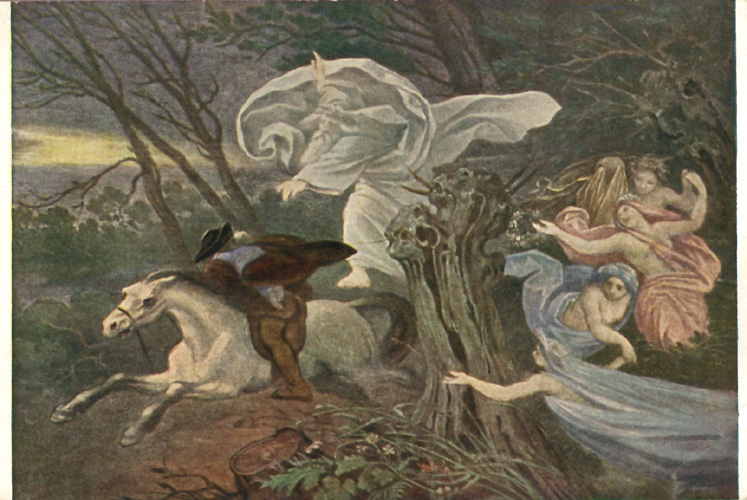By Agate Rublovska
The one to share some of the ‘hidden’ aspects of her culture this time is Clara Spohrer, a third semester Philosophy, Music and Literature student from Germany, Frankfurt.
When deciding on what example to give of a traditional, defining aspect of her culture, Clara said that she sought something that “every German would know”. What she consequently settled on is a certain poem—“a poem that every single older German has had to learn by heart in school, and, if you’d mention the title, they would still probably be able to recite some lines from it.” It is a poem by Johann Wolfgang van Goethe, “Der Erlkönig”.
This poem tells the story of a father and a son riding home on the back of a horse in the middle of the night, through a dark forest. The boy tells his father that the Erl-king, a dark, dangerous spirit, had talked to him, and had attempted to lurk the child into following him. The father tries to calm the boy by reassuring him that what he actually heard and saw must have been real, rational things: the fog, the branches, the shadows, and so on. However, the boy insists that he has been harmed by the Erl-king. The father hurries home only to discover that his son has died on the way.
The roots of this dark, fascinating story are found in a Scandinavian ballad most often known by its Danish name Elveskud. The origins of this ballad are unclear: it has been found in multiple variations in Scandinavia alone, and ballads with a strongly parallel storyline have been found elsewhere in Europe. Moreover, there is still some uncertainty about the title of the poem, since the etymology of the word “Erlkönig” and its intended translation to English are still being debated. Therefore it is not clear whether the title should be “Elf King” or “Alder King”, or just “Erl-King”, as well as whether the character itself originates in Scandinavian mythology or elsewhere. However, in most cases, the characteristics of this figure are rather constant: it is a mystical being that dwells in forests and is unfriendly to humans, especially children, seeking to harm them at slightest chance.
However, the storyline aside, Clara stresses the importance of the highly skilled use of language in Goethe’s poem: “For me, the beauty of the language and its perfect form even overpowers the story itself. This, of course, is more noticeable in German than in English.”
Here follows an extract of the poem in English:
Who rides there so late through the night dark and drear?
The father it is, with his infant so dear;
He holdeth the boy tightly clasp’d in his arm,
He holdeth him safely, he keepeth him warm.
“My son, wherefore seek’st thou thy face thus to hide?”
“Look, father, the Erl-King is close by our side!
Dost see not the Erl-King, with crown and with train?”
“My son, ’tis the mist rising over the plain.”
“Oh, come, thou dear infant! oh come thou with me!
Full many a game I will play there with thee;
On my strand, lovely flowers their blossoms unfold,
My mother shall grace thee with garments of gold.”
“My father, my father, and dost thou not hear
The words that the Erl-King now breathes in mine ear?”
“Be calm, dearest child, ’tis thy fancy deceives;
‘Tis the sad wind that sighs through the withering leaves.”
Undeniably, Goethe still has a special status in the minds of the German nation. As Clara explains: “He is the German Shakespeare. His legacy is still very much present in the German society— his works are taught in all high schools all over the country. Our generation was one of the last ones to learn the ‘Erlkönig’ by heart, but all the older people know it. Every high school graduate in Germany must have read and discussed ‘Faust’, his most famous drama. In addition, he has inspired many proverbs in German language, like Shakespeare did in English.’’
Speaking of Goethe’s intellectual legacy, Clara stresses that “he is still looked upon as the German poet, the intellectual. People are proud of him, and, according to some, he is the best poet we have ever had. His mastery of German language remains unparalleled.”
With regards to a more contemporary ‘piece of culture’, Clara mentions Loriot (in his real name – Bernhard-Victor Christoph-Carl von Bülow), a German comedian, actor, and director.
As Clara explains: “He is the definition of German humour, a classic. His productions have been incredibly successful and liked across the country, and I think that is because he managed to create a precise, realistic and satirical portrayal of the ‘typical German’ – all the mannerisms prevalent in the German society were portrayed in such a detail that most of the people could relate to it, feeling it was them, or their friends or family members that were being depicted. Lariot’s humour was always dense in cultural references. Moreover, he and his partner Evelyn Hamann were exceptional actors, capable of conveying the detailed sketches particularly well.”
Lariot’s work has had such a broad influence on the German culture that some events were unimaginable without his jokes: ‘He has a little film about Christmas. Many families watch that video every Christmas—it has become a tradition’.
When Loriot died in August 2011, the news was filled with mournful stories for weeks. “Germany loved him, and in some way his jokes were part of the German culture.”
The video that Clara suggests is the one on Christmas in a ‘typical German family.’ The video is in German, but it has English subtitles for the non-German speakers.
Enjoy!
http://www.youtube.com/watch?v=DPIQwc-Jyyg
Agate Rublovska, class of 2015, is a Linguistics and Cognitive Science major from Riga, Latvia

